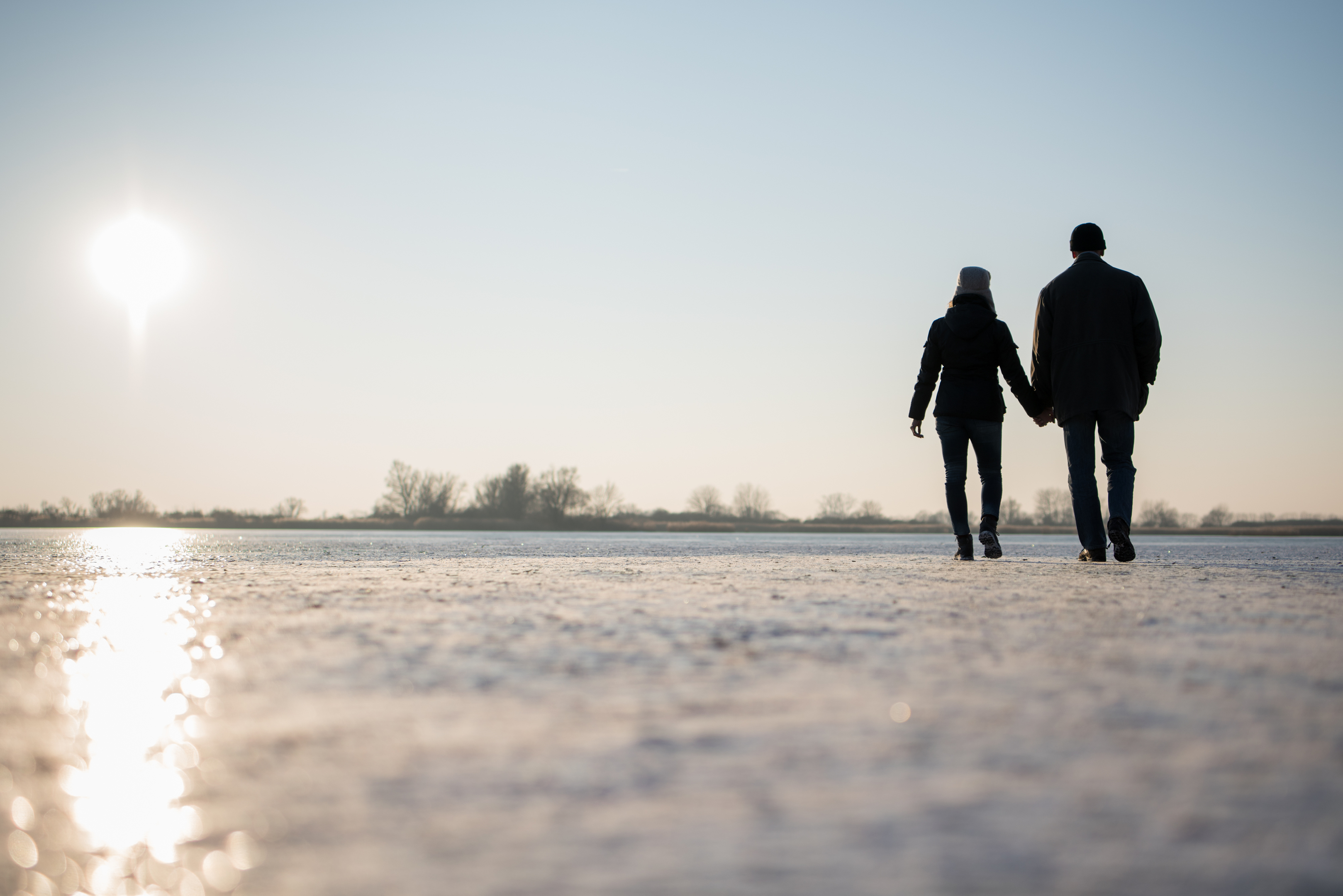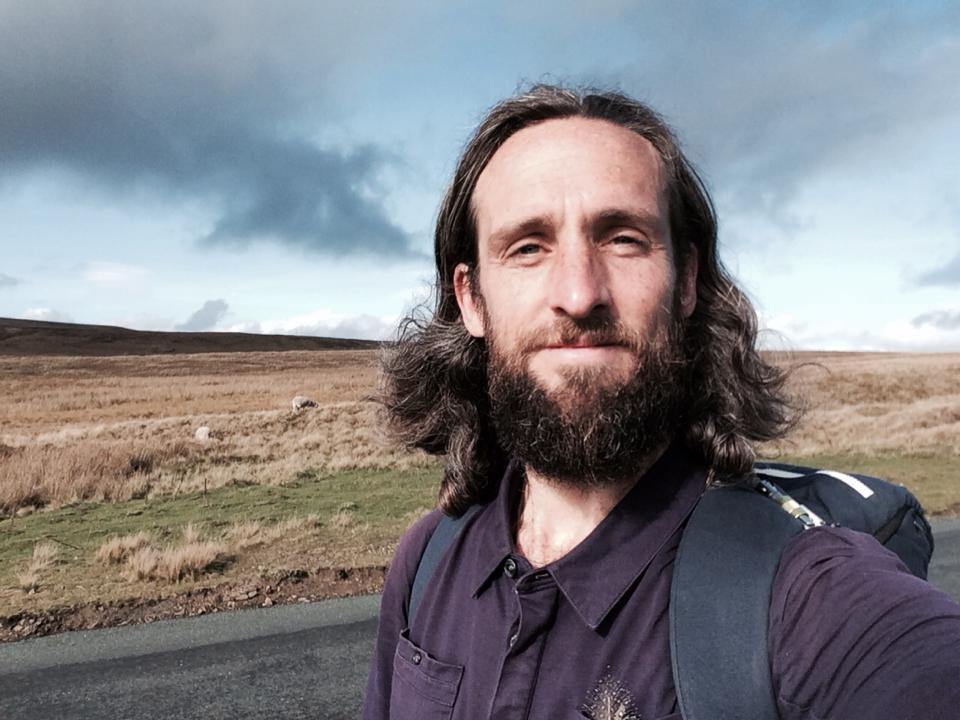
BEFORE he set out to walk 500 miles across Scotland in search of love stories, Matt Hopwood was warned it might be a little tricky.
He said: “I was told that Scottish people are friendly and can talk for hours but they don’t talk about their emotions.
“I thought it would be difficult to get people to open up but it’s actually been very easy to connect with people and hear their stories.”
For his book, A Human Love Story: Journeys To The Heart, Matt spent five weeks walking through the Borders, along the Central Belt, up to Oban and across the Western Isles from Barra to the Isle of Lewis.
He relied on the generosity of strangers for shelter and company and asked those he met along the way to tell him their stories.
These are published anonymously and cover paternal devotion, fleeting romances, loss and longing, the appeal of a place or passion and also love that spans decades.
“Something that seemed to resonate in Scotland was the difficulty of expressing love,” added Matt.
“People told me their parents didn’t say ‘I love you’ and so later in life, they wanted to tell their parents they loved them but felt they couldn’t say the words.
“Another interesting thing in Scotland was that more men shared their stories with me than women.
“I thought these men would be big, tough and unexpressive but actually men were much more willing to open up.”
Matt’s aim is to build, grow and enhance connections between people and communities by sharing love stories.
“Everyone has a love story because they’re essentially our life stories,” he added. “Sharing these stories and allowing someone to be vulnerable, open and honest about these profound moments in their life is a powerful thing.”
A Human Love Story: Journey To The Heart, published by Birlinn, out now
‘I lost everything I had but what I found was so much more’
There must be so many people who go through relationships where they’re just in it because they think they should be in it. That’s what I was doing. The reason I was with my ex for 17 years was because I thought that’s what I had to do.
I thought I had to get married at some point and have children at some point. It just became the next step. I remember my company was going through a bad patch and my daughter had been born and was going to school and my ex had made it clear she didn’t want any more children.
I had turned 40, I had a new car, I had a really good pension, I was miserable and I had bookmarked natural burial sites on my computer because I thought that was my next thing. Isn’t that weird?
Just seeing people on the street, seeing people together, seeing families together, I’d look around and think: “How many people are just doing it because they think they have to do it, and they’d be much happier if they weren’t?”
So I went from a nice house – new car, nice pension, company doing well – to a couple of years later with Stephanie, having nothing, the company gone, the car was getting older, the ex-wife had the house. Sometimes I’d have just £10 for the week – but I was so happy.
‘This is more than my home. The island is my place to be’
A lot of young people, when they reach 17 and 18, go to Glasgow but almost all of them still look to the islands as home. People may be away for 16 or 17 years or even 30 years, but the islands are still home.
It’s a cord that people feel they are attached to. I came back to stay here because I felt it was my home. There’s something about the sea and the sky and the place itself that is in you. You belong. You have a sense of belonging to something and being part of something. I come down and walk on the beach with my dog, and I’m usually the only one here. We never see anyone, but this place is my place to be.
‘I do it as a thank you. A thank you for a cake left in the doorstep’
I work in the hospice to give something back to them because they looked after my sister. My sister died at 7.20pm. The nightshift hospice lady who looked after my sister at home had had a long shift – she was there from 10am to 7.30pm. And she went home and baked a cake and came back and put it on the doorstep.
So it’s in memory of her baking a cake after a really long and hard shift. She’d been with my sister about a week, so she got very close to her. I do hairdressing.
It’s a thank you for the cake on the doorstep, a lovely thing to do.
‘I know what he’ll do before he does. It’s been 24 years but doesn’t feel it’
We met when he was dancing to Right Said Fred’s I’m Too Sexy and he decided to take his top off!
How many years have we been together now? About 24 years, and we’ve had two children. But it doesn’t feel like 24 years – oh my God no! I know everything about him. I know what he’s going to say before he says it. It’s good because I know what he’s going to do before he does it, because he’s very cheeky.
He’s good fun. He’s such a good dad, so patient. I knew he would always be a good dad because he was such a nice person.
My daughter is 21 and my son is 17. My daughter will phone him every night needing advice for this, for that. She was born very premature – 11 weeks early. And he was so good. He held her before I could, in the lift up to intensive care. I love children. I’m desperate for grandchildren, desperate for that next chapter.
‘He does this double-blink… he really sees me’
If I had to capture an image it would be this – I’m sitting in the dining room and it’s late lunch-time and then I see Uzi coming in. And he comes in and he’s got these woollen socks and his work boots on and he’s kind of tripping into the dining room. And he’s picking up his tray and looking round the dining room and then he sees me.
And he does this kind of double blink. He does this double blink, with this beautiful smile, and he sees me. He really sees me. I would capture that, just that.
‘I’ve never told my mum ‘I love you’ and she has never told me’
I’ve never said to my mum, “I love you,” and my mum has never said it to me.
I know she loves me but I’ve never heard those words. My mum’s 83 now so, you know, I don’t know how much longer I’ll have her. I mean, every time I leave her I give her a big cuddle, but I can’t say those words.
I lost my dad six years ago. He didn’t show emotion – he was brought up that way. At Christmas, New Year, if I went to give him a cuddle, it was very much that I knew he didn’t want me to give him a cuddle. So I wouldn’t really say I cuddled him – I maybe put my arms around him, but I didn’t cuddle him!
But I’ve always felt my mum wanted to show her feelings more. But she, again, was very old-fashioned – she never did anything that would displease my dad because he was the boss. When my dad was here I never even got a cuddle from my mum. I would at Christmas or birthdays, but that would be it.
But our relationship has changed, I think. It’s like my mum is being more herself now that he’s not there, much as she’d love still to have him there – but she is different. And my relationship with my mum is different, and we have a cuddle every time I leave her. But I just can’t say these words.
‘I booked a holiday but we never got to go. She shut her eyes and that was it’
It was on our anniversary. I woke up and she was crying. She says: “I’m scared.” “What do you mean, scared?” She says to me: “I love you, but I’m scared.” I said: “Don’t be scared – there’s still a lot of life to be lived. You’ll be here, you’ll be fine. You did us proud.”
I’d booked up a holiday and everything else as a surprise for her. We never got to the holiday. She only lasted six months and that was it. On her deathbed she looked round to everybody gathered there, and she turned around to me and said “I love you, “ shut her eyes, and that was it.
I’ll never forget that. I’ll never forget it. The love I lack is unbearable, to be honest. And I’m not coping, to be honest. I’m not. How to cope? Where to start?

Enjoy the convenience of having The Sunday Post delivered as a digital ePaper straight to your smartphone, tablet or computer.
Subscribe for only £5.49 a month and enjoy all the benefits of the printed paper as a digital replica.
Subscribe